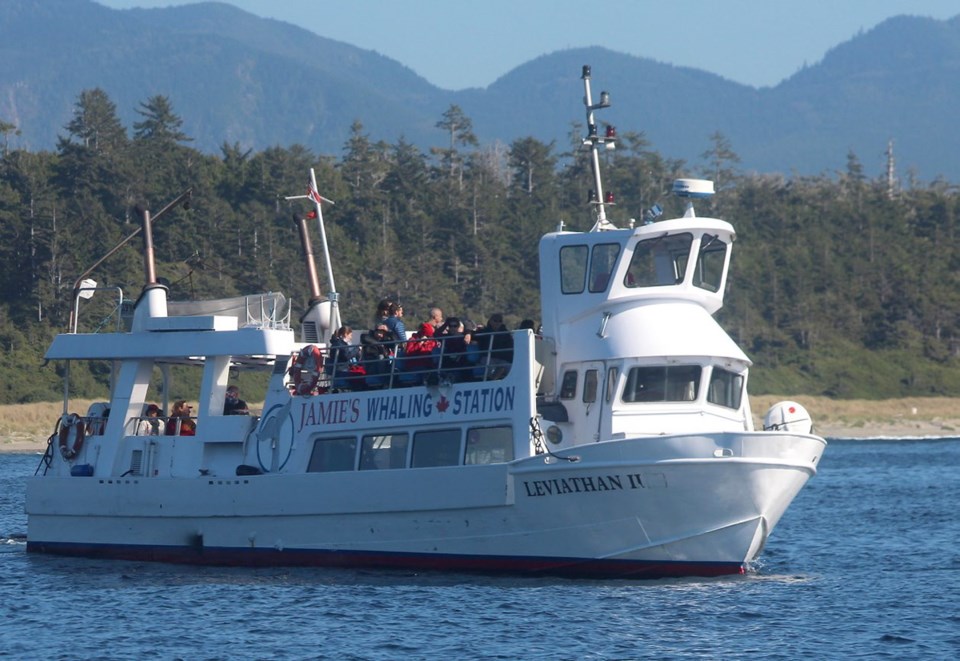Every sector of Tofino’s community is reeling from the horror of lives lost at sea during what was supposed a fun-filled excursion to view the rugged west coast off Vancouver Island and its wildlife.
Tofino, a tightly knit community of close to 2,000, has gone flat-out to search the waters and help each other in the wake of the accident. It’s impressive the way the community has come together, Frank Bourree, tourism consultant with Chemistry Consulting in Victoria, said Monday.
In the past, he presented Jamie’s Whaling Station with an award on behalf of Tourism B.C.
“They really adhere to safety standards and training and have a really good culture inside that organization.”
Looking into the future, Bourree said, “I don’t think this is going to affect the tourism industry or the whale-watching business.”
Tofino is renowned for its proximity to Pacific Rim National Park, which draws visitors year-round to admire the beauty of its miles of beaches and to enjoy storm-watching in the winter. Every spring Tofino and neighbour Ucluelet celebrate an annual whale festival as massive grey whales head north.
Brock Smith, professor of marketing and entrepreneurship and Winspear Scholar at UVic’s Peter B. Gustavson School of Business, said whale-watching is just one attraction for tourists in Tofino. “I would not anticipate the incident to really hurt the tourism industry overall.”
When it comes to crisis management, people look for a genuine apology. That doesn’t mean a company has to suggest it was at fault but rather offer an apology for the situation, Smith said.
Also key is announcing that an investigation will be carried out, with a reasonable time line, and a promise to fix what went wrong in the hopes of eliminating or minimizing the chance of it taking place again, he said.
Tourism Tofino sent out a tweet Monday stating, “Thank you to everyone from near and far for their support at this difficult time. Our community, visitors and industry are leaning on each other.”
One Tofino hotel is hosting the sole family member among one group of its guests to survive. Other family members are on their way to be with that individual, a hotel spokesperson said Monday.
“We are doing whatever we can to be supportive and take away any concerns whatsoever.”
Local restaurants and hotels are pitching in to provide food for a community potluck planned for Monday evening. “Everybody needs to gather and be together,” the official said.
The Tofino visitor centre will be closed for an undetermined amount of time, the Tofino Chamber of Commerce said on Facebook.
“Our thoughts and prayers are with all those involved in [Sunday’s] tragic accident off the coast of Tofino. We echo Tofino Mayor Josie Osborne’s thanks to our first responders, emergency services, and neighbouring communities for their support during this difficult time.”
The chamber’s incoming executive director, Jen Dart, said in an interview, “It’s a terrible day in Tofino.”
“We are trying to get through as a community.”
Michael Harris, executive director of the Pacific Whale Watch Association representing 36 operators in B.C. and in the U.S., said that group has had no serious incidents since it was founded about 25 years ago.
Every year, members operate 14,000 trips and carry about 400,000 passengers, he said.
Just last month an association member pulled a diver with the bends to safety off Orcas Island, one of the San Juan Islands, Harris said.
Association members do not include operators from Tofino and Ucluelet, he said. Even so, “We are all part of the same whale-watching community.”
They know each other and are in shock, he said.
If there is any good to come out of this tragedy it will be what can be learned from it, he said.
Medium-sized vessels, such as the 65-foot Leviathan II, operate under a different licence from smaller inflatable boats, where passengers are required to wear life saving gear, said Dan Kukat, one of the founders of the Pacific Whale Watch Association and owner of SpringTide Whale Tours and Charters in Victoria.
Boats the size of the Leviathan carry a lot of life-saving equipment including life-jackets, and life-rafts that can be launched very quickly, Kukat said.
Members of the association, many based out of the capital region, operate on inside waters, a different environment from those in the Tofino area, he said.
The Island’s west coast is more of an exposed, ocean environment in a more remote location with different kinds of water, Kukat said.
Nearly 20 years ago, he worked with others to craft stiffer standards for the whale-watching industry. When SpringTide vessels take out passengers they exceed federal safety criteria, he said.
“You just put in as many procedures and policies into place as you possibly can in order to try to avert such a tragedy, and there are ample of those available.”
Regulations cover certification of vessels, their construction and operator training and experience, he said.
Safety standards of Canada and the association are considered stringent and have been adopted elsewhere in the world, not only for whale-watching, Kukat said.
This incident will prompt whale-watching companies take an extra-close and fresh look at their own operations, including policies and procedures, he said. [email protected]



